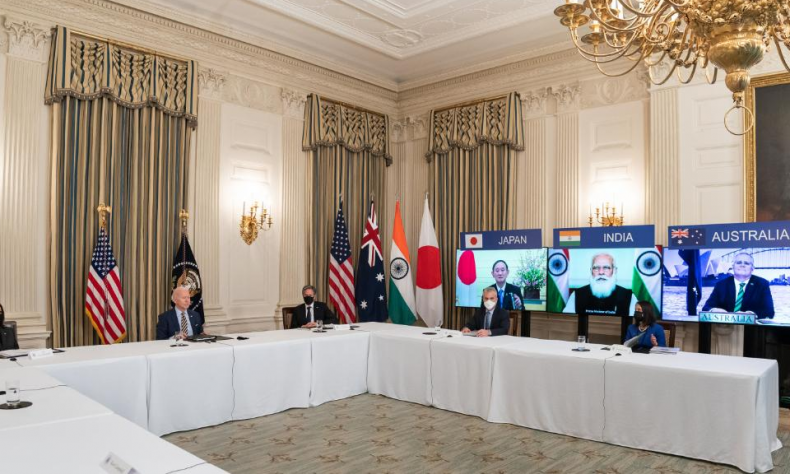QUAD-Contradictions in the QUAD

For the QUAD to live up to its claim to serve the interests of the whole regional community they will need to resolve the Quad-contradictions between the past and the future. They are not off to a good start.
What did we really learn from the Quadrilateral Security Dialogue (QUAD) meeting of the leaders of the US, Japan, India and Australia held on March 12? This is the first leaders’ meeting of QUAD. We learned that a QUAD backed rollout of vaccine is not subversive vaccine diplomacy but that China’s rollout of vaccine support for other countries is ‘nasty’ vaccine diplomacy that has to be countered.
We learned that the QUAD has no intention of cooperating with China in the vaccine rollout, delivery, manufacture or in mutual recognition of vaccines. Money remains king for the QUAD because three of its members refused to support a move for patent free production of vaccines.
We learned that the QUAD supported the international rule of law, but that it would not allow China to be involved in framing these laws.
We learned that compliance with UNCLOS rulings and other international conventions did not apply to the US occupied military base and UK ‘owned’ Chagos island of Diego Garcia despite UN rulings to the contrary.
We learned the QUAD was unconcerned about the nearly 200 deaths for democracy in Myanmar so they only whispered when asking the Myanmar military to stop shooting peaceful demonstrators.
We learned the QUAD remained very concerned about protests in Hong Kong and they continue to loudly voice their objections and interfere in the domestic affairs of China. Meanwhile the elected congressman representing three million US citizens from the strategically important American vassal province, Puerto Rico, is still unable to vote in the Congress. The one country, two systems discrimination applies to all American-controlled unincorporated territories.
We learned the QUAD was united in “a shared vision for the … standards and norms for emerging technologies” – but only if they were American and Japanese standards. We learned the QUAD wanted to exclude China from cooperative involvement in setting the standards for the digital economy.
We learned that the QUAD’s concern for protection of its logistics supply routes in the South China Sea in the name of their sovereignty was legitimate. We learned they believed that China’s same concerns were not legitimate, and that they were evidence of military threat and expansionism and wolf warrior diplomacy.
We learned that the old ‘coca cola colony’ nickname for Australia dating from the 1960’s is gaining new currency and relevance.
We also learned a great deal from the muted regional reaction to the QUAD meeting. Asia is not comfortable with the implied belligerence of these ex-colonial powers and India. The ASEAN region has been bullied and socially and physically devastated within living memory, first by Japan, and then by the United States war with Vietnam, Laos and Cambodia. There is little appetite in ASEAN for a repeat performance. ASEAN powers have come to prefer cooperation rather than the confrontation that made Asia a battlefield proxy for the cold war between the US and the Soviet Union.
ASEAN powers remember the often-violent struggles to break free from the colonial rule of the English in Malaysia, from the Dutch in Indonesia, the French in Cambodia, Laos and Vietnam, the Spanish and later the Americans in the Philippines. They remember with no affection the way despots were supported by the United States, England, France and Australia because these dictatorships protected the commercial interests of these foreign powers.
Compliance with the global rule of law has played an important role in the stability of the region in recent decades. The QUAD is correct in pointing to this feature despite some of its members honouring the rule of law more in the breach than in the observance.
Unfortunately, the QUAD seems not to understand that times have changed and that the acceptance of the rule of law in the region now depends not on force, but on cooperation and recognition of China’s legitimate interests.
We cannot under estimate the important role that mutual respect has played in delivering peace and change to the ASEAN region. At times it has involved some uncomfortable acceptance of several authoritarian governments, from the benign in Singapore and Thailand to the more repressive.
The QUAD does not see these contradictions and in its first meeting it clearly favoured confrontation over cooperation. Powerful as several of these QUAD partners are, it remains to be seen just how much voluntary support they can muster from others in the region.
For the QUAD to live up to its claim to serve the interests of the whole regional community they will need to resolve the Quad-contradictions between the past and the future. They are not off to a good start.
The article reflects the author’s opinions, and not necessarily the views of China Focus.
 Facebook
Facebook
 Twitter
Twitter
 Linkedin
Linkedin
 Google +
Google +



